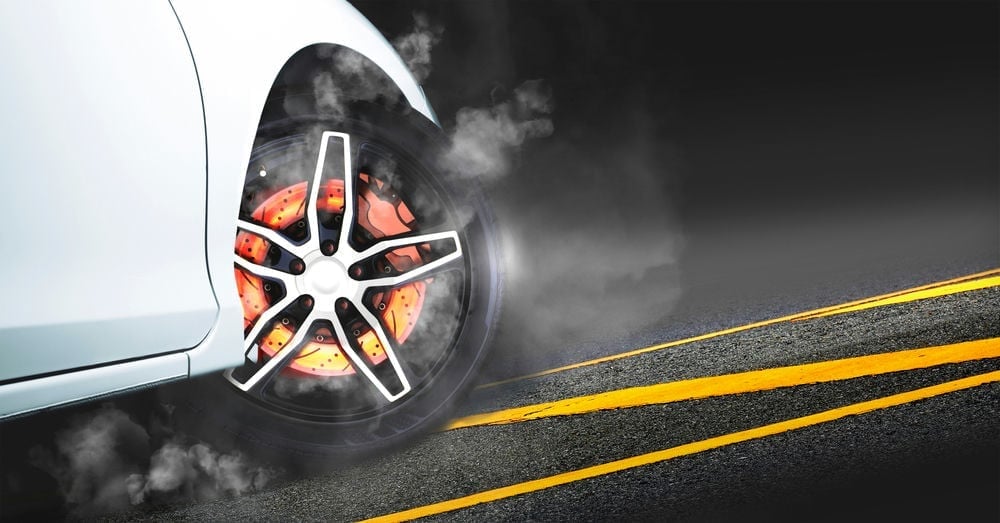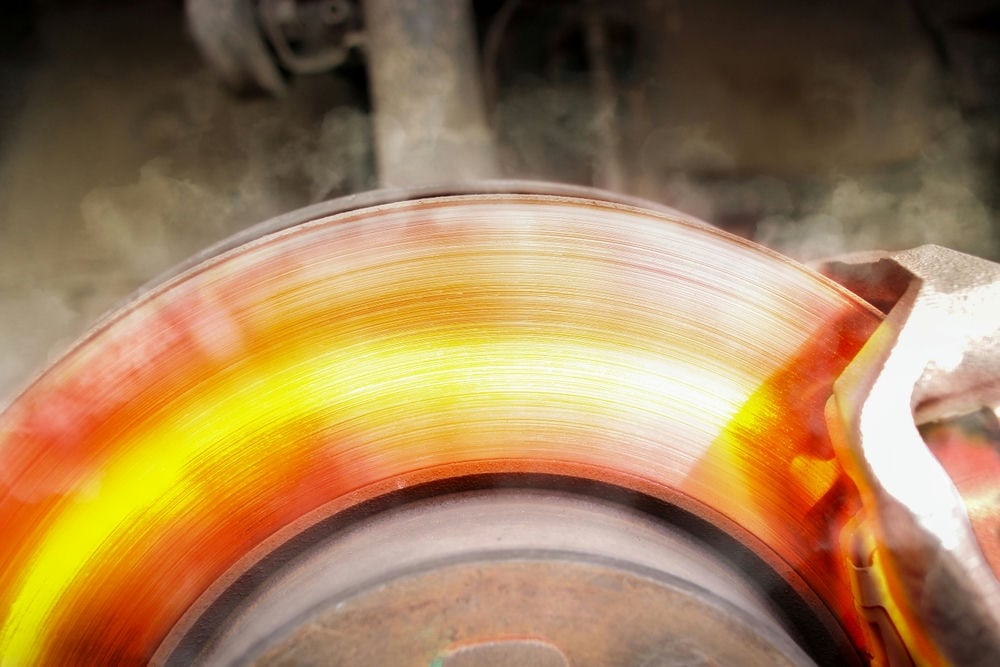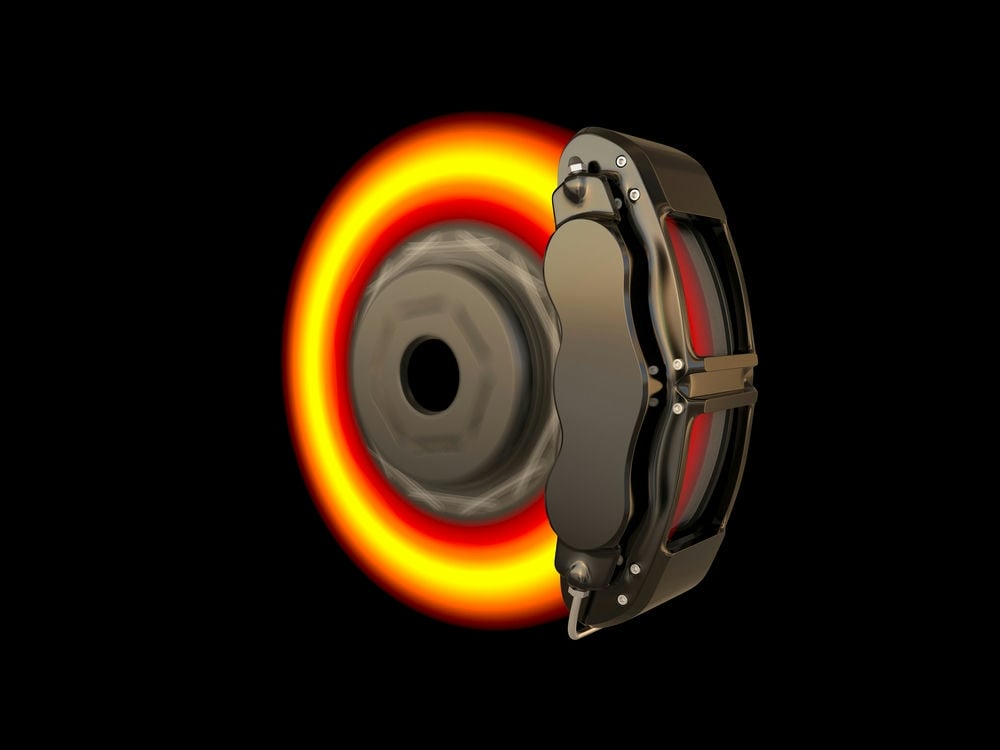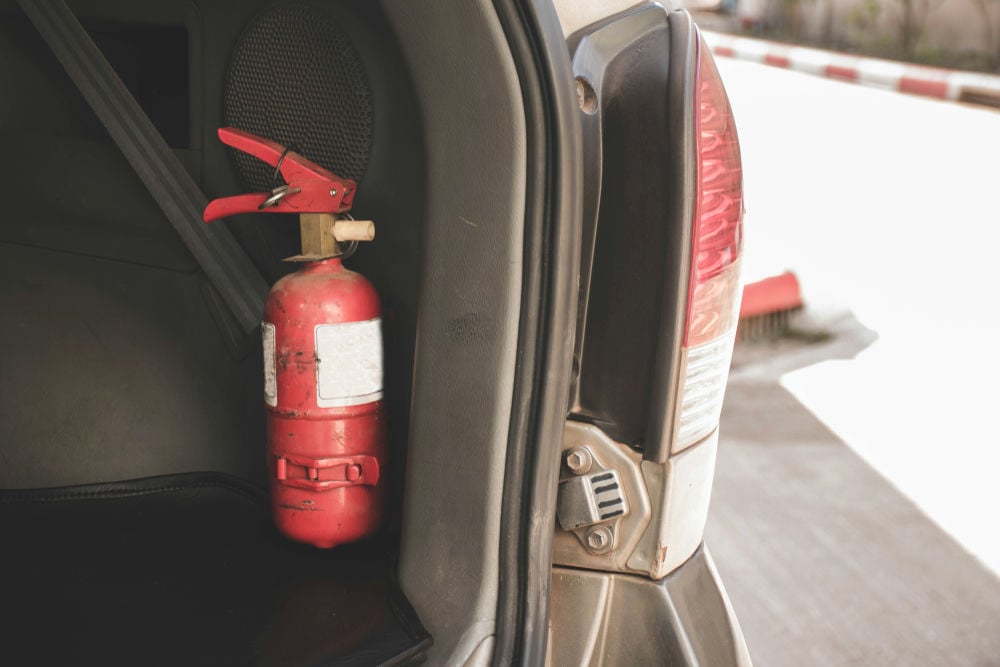
Your brakes work incredibly hard to stop your car and keep you safe, even
under the harshest conditions. But, unfortunately, all that work can lead
to extremely hot temperatures.
The brakes on your car can catch fire, but it usually takes extreme
circumstances for that to happen. The most likely causes of a brake
fire would be a seized brake caliper or worn-out brake pads. Either of
these would cause metal friction and a rapid increase in temperature,
which could lead to possible ignition.
 A car with hot brakes.
A car with hot brakes.
At What Temperature Do Brakes Catch Fire?
It's important to understand that a brake fire won't usually be caused by
any metal components catching fire.
The metal of these parts can withstand extreme temperatures that are almost
always lower than the ignition point of the steel or iron components.
Instead, the actual ignition will be caused by the temperature of the brake
parts getting hot enough to burn the more flammable brake fluid or grease
inside the wheel hubs.
Your car's brake system consists of several different components. Each of
these parts is made from other materials, each with a different possible
ignition temperature.
Ignition Temperature of Brake Components
-
DOT 3 brake fluid:
Normally between 500-750 degrees Fahrenheit. Even though DOT 3 brake
fluid is non-volatile, it doesn't create chemical vapors that easily
combust; it is still a flammable liquid that will burn if it gets hot
enough.
(1)
(2)
-
Brake pads:
Depends on the pads' material, but most can withstand temperatures well
over 1000 degrees Fahrenheit without igniting.
(3)
-
Brake rotors and calipers:
Similar to brake pads, the rotors and calipers can withstand extremely
high temperatures, sometimes even over 1500 degrees Fahrenheit, without
igniting. These components are made of metal, so they won't easily
catch fire.
 Excessive braking generates extreme heat.
Excessive braking generates extreme heat.
Can Brake Pads Cause Fire?
One of the most likely causes of a brake fire is a worn-out brake pad that
has lost all of its pad material and is down to the metal backing plate.
Brake pads are thick ceramic or composite metallic pad material bonded to a
solid metal backing plate.
This pad material is designed to withstand extreme heat caused by heavy
brake use.
However, once this pad material is completely worn away by normal use and
friction, all that's left is the solid metal backing plate.
This backing plate will grind against the brake rotor and generate much
more heat and friction than the pad material would.
This heat and friction can cause the rotor and caliper to heat up quickly
enough to ignite the volatile components of the brakes.
Can A Seized Brake Caliper Catch Fire?
A seized brake caliper is the other most likely cause of a brake fire.
The brake caliper is the part that holds the pads against the rotors. The
caliper has a piston inside of it that is forced out by brake fluid
pressure when the brake pedal is pressed.
This piston typically applies just enough pressure to the brake pad and
rotor to cause friction to slow your car down.
Occasionally, the piston can become stuck in its outward position instead
of returning to its normal resting position.
If this happens, it will begin to cause tremendous friction on the brake
pads and rotors. It will also prevent the brakes from being able to cool
down as they usually would.
This rapid increase in friction and lack of cooling can easily cause the
brake components to reach possible ignition temperatures.
What Happens If My Brakes Catch Fire?
If your brakes catch fire, it will be a severe safety risk to you and any
other passengers with you or cars on the road.
Your brakes can quickly lose their stopping power if they get hot enough to
ignite.
If this happens, you will have to act calmly and quickly to get your
vehicle off the road.
Try to safely pull as far off the road as you can onto the shoulder of the
road until you can bring your car to a complete stop.
You may be tempted to shift your transmission to neutral, but you will get
extra assistance from your transmission gearing down if you leave it in
drive.
Once you can get your car completely stopped, put it in park and get out of
the vehicle as quickly and safely as possible. Call 911 or have someone
else call if you aren't able to.
Be sure to get far enough away from the car that you're out of range of
possible injury if the fire spreads to the rest of the vehicle or if your
tire gets hot enough to explode.
 A seized brake caliper can generate excessive heat.
A seized brake caliper can generate excessive heat.
Why Do My Brakes Smell Like They Are Burning?
The most likely cause of your brakes' burning smell is a stuck caliper or
grinding brake pads.
Either of these causes will generate too much friction on the metal surface
of your brake rotor, which will cause it to begin overheating.
This overheated metal usually causes the burning smell you may notice
coming from your brakes.
What Happens If You Drive On Grinding Brakes?
Driving your car with grinding brakes can lead to extensive damage to your
whole braking system.
If your brake pads wear down to the backing plate, that backing plate will
begin grinding against your brake rotor.
If you let this metal-to-metal grinding continue for even a short time, it
can ruin your rotor. Even a brand-new rotor can quickly be destroyed by
metal grinding.
This grinding can also cause damage to your calipers from heat, friction,
or vibrations caused by metal-to-metal contact.
 A fire extinguisher can extinguish brake fires.
A fire extinguisher can extinguish brake fires.
How Do You Extinguish A Brake Fire?
Since brake fires will usually burn hot enough to ignite the system's axle
grease and brake fluid, a dry chemical extinguisher is the best option for
controlling a brake fire.
Water can effectively cool down the affected area but won't extinguish any
grease or oil-based flames. It can also cause the fire to spread to other
areas of the car, so it should be used carefully.
Is It Normal For Brakes To Be Hot?
It's normal for your brakes to be hot while you're driving.
Since the brakes use friction between the pads and rotors or drums to slow
down your car, they generate a good amount of heat.
Most brakes become more effective as they warm up during normal operation
while you're driving around.
You shouldn't worry about them getting hot if they don't overheat.
Conclusion
Your brakes can catch fire under extreme circumstances, but they will
almost always give you some prior warning signs that this is close to
happening.
Be sure to listen to your car if it's trying to tell you that you may have
a problem with your brakes!